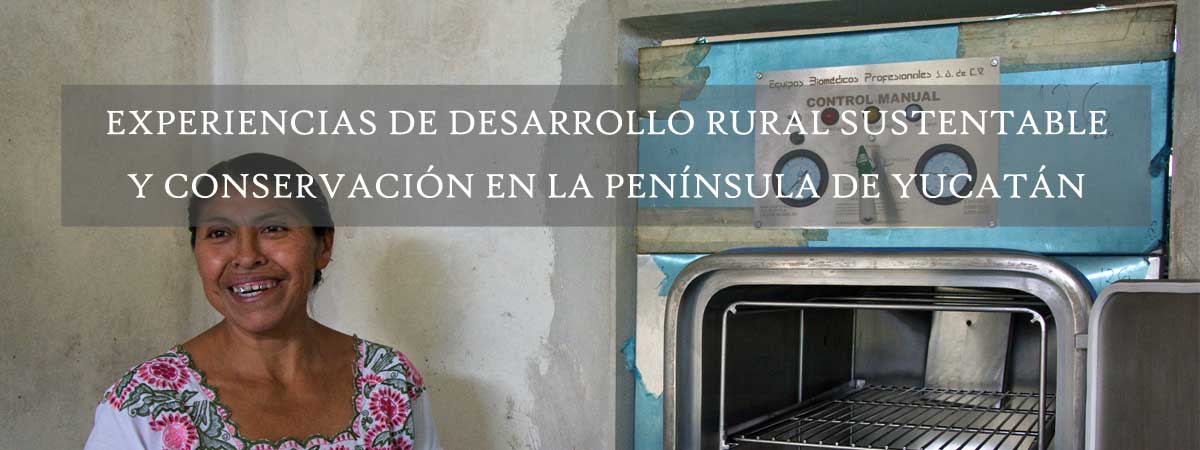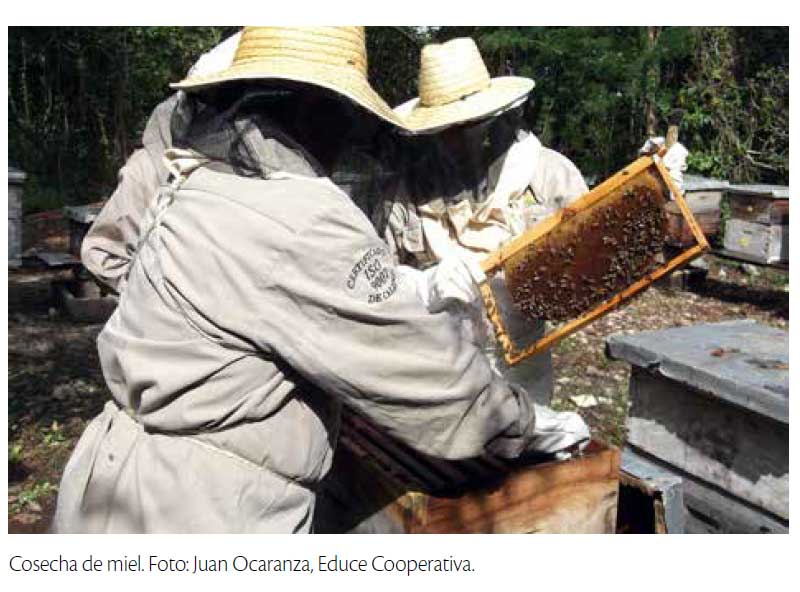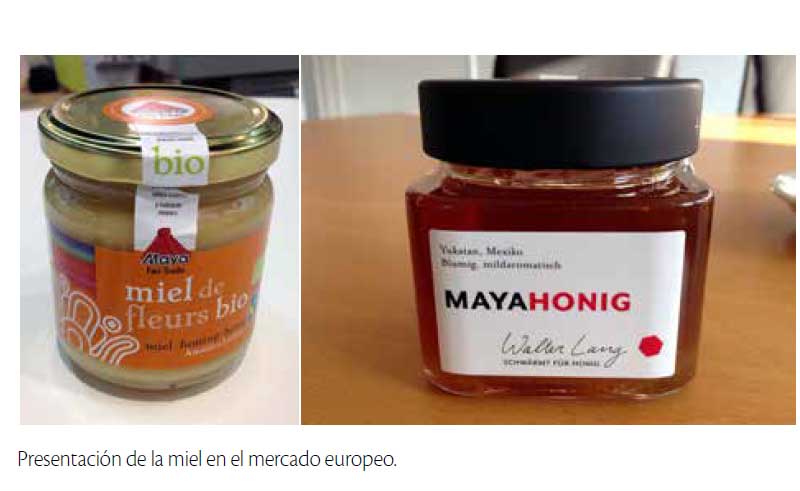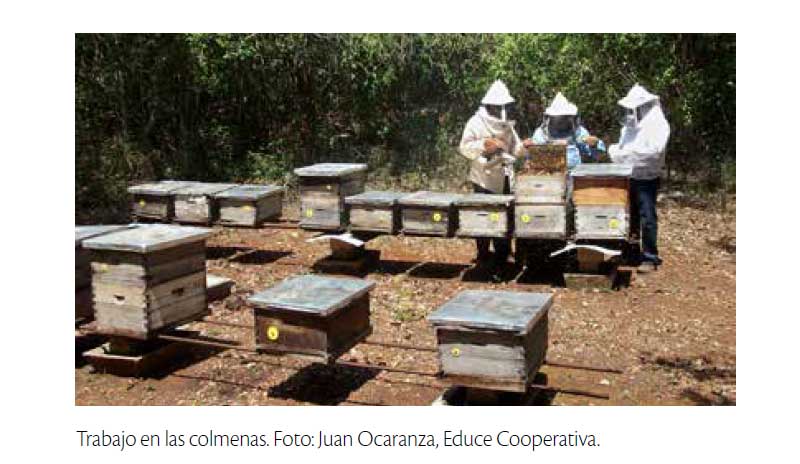A local honey on the international market
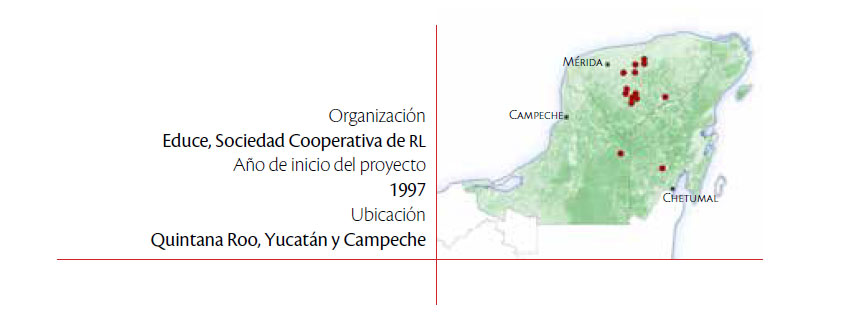 EDUCE Cooperative is an initiative that arises from the EDUCE AC civil association. The association began its work in 1989 with the youth of Hopelchen, Campeche; and one of the first initiatives was to promote beekeeping and honey production as an option to improve the quality of life in the communities. This initiative was well received and funds for training and technical assistance were obtained, so over the years they managed to produce high quality organic honey. This was the result of the effort and dedication of a committed group, but the last obstacle had to be eluded: marketing. The honey was sold to middlemen, and the difference in quality that the producer group was able to offer was not financially compensated. The response was immediate, and a group of partners from the civil association suggested the idea of seeking a proper marketing mechanism in the form of a cooperative. Thus EDUCE-Coop was born, which now exports 98% of the production of its partners and associates directly to Europe, being able to meet the highest standards of marketing with certified organic and fair trade honey. Its greatest achievement has been to provide ongoing training, technical and sales support, and creating marketing opportunities.
Initially the cooperative started working with some groups of producers in southern Quintana Roo and Campeche. The main objective was to shorten the value chain so that a greater percentage of the final price would fall into the producer's hands. Until that time honey was sold to a middleman, who usually sells at a small gathering center, which in turn sells to a higher collection center that then sells it to an exporter. Juan Ocaranza, project coordinator of EDUCE-Coop, mentions that the first direct exports were made in 1998, mainly through the efforts of Miguel Ángel Munguía, director of the cooperative. However, so far the delivery volumes were not large enough to have a real impact on price formation and reducing operating costs.
"The first key moment, Juan Ocaranza explains, was around the year 2000 when EDUCE-Coop initiated a learning process on technical assistance, marketing and negotiation with clients, a period that was necessary if one considers that the goal was to place the product with organic and fair trade certification, which was achieved". In the first stage the main limitation was the time required for the learning process, and there was a stabilization period in which the handled volumes did not allow to lower the costs. In 2010, with all the success that had been achieved and with consolidated trade relations, the cooperative members felt it was time to grow so as to have a greater role in the honey market. Moreover, the headquarters of the cooperative are located in the Yucatan state, and the groups of producers were in Quintana Roo and Campeche. It was time to start promotion work to include producers of Yucatan. They began by organizing meetings to explain the EDUCE-Coop proposal, attended by up to one hundred producers. However, Juan explains, most beekeepers are discouraged to hear that the cooperative does not bring in money, and that it is an organization of peer-to-peer workers seeking organic certification, fair prices and a scheme where everyone wins. The result was that those who were really willing to make joint efforts remained, ie. between ten and twenty producers in each of the thirteen communities of Yucatan. In order to receive financial support, in 2011 the groups were established in thirteen cooperatives, and received a small grant from SEMARNAT for the purchase of equipment. "This step was crucial, Juan says, because before starting to produce they were already receiving support, and this greatly encouraged producers. Then financing was achieved to cover half of the costs of organic certification, which was finally obtained in 2013, year in which the increase in price and farmers' income was perceived." Added to this, the Global Environment Fund (GEF) gave support to the thirteen groups for the construction of storage facilities and purchase of equipment, in exchange for a commitment to develop strategies for improvement of the forest and the melliferous flora. In addition to the direct benefit of having the infrastructure to achieve a product isolated of contamination, this support encouraged producers even more. While the cooperative has managed to place its products on one of the most demanding markets, there is a great threat, Juan explains. In 2013, the European Court determined that if marketed honey has residues of transgenic pollen it should be labeled, although nowadays there is an amendment to this provision. That means that placing honey on the shelf in Europe that has transgenic crop residues, people will simply not buy it. There is a threat today that transgenic soy will be planted in the peninsula. "If contamination occurs whether it is legal or not, business is over". Lessons learned "The first major step we take is to ensure that people have the will to change," Juan explains. When they have the will and the necessary tools to create change, power is built so that they can change. Partners in the beginning had the will to change, the cooperative provided technical assistance and training, communities contributed with their knowledge, and thus the power to change was generated. Don Manuel says that "in EDUCE-Coop there is mutual respect, a consolidated trust between the business side and the producer’s side", to which Juan adds that "the only way to build organization is through trust… That would be my big take away". Currently, EDUCE Cooperative also explores the relationship between beekeeping and land use. The health of ecosystems is very important to ensure honey production. Bee colonies depend on the forest, but also on compatible production systems, such as corn and the creation of acahuales in order to maintain a production throughout the year. In this sense, beekeeping is compatible with sustainable landscapes promoted through sustainable rural development actions.
|
